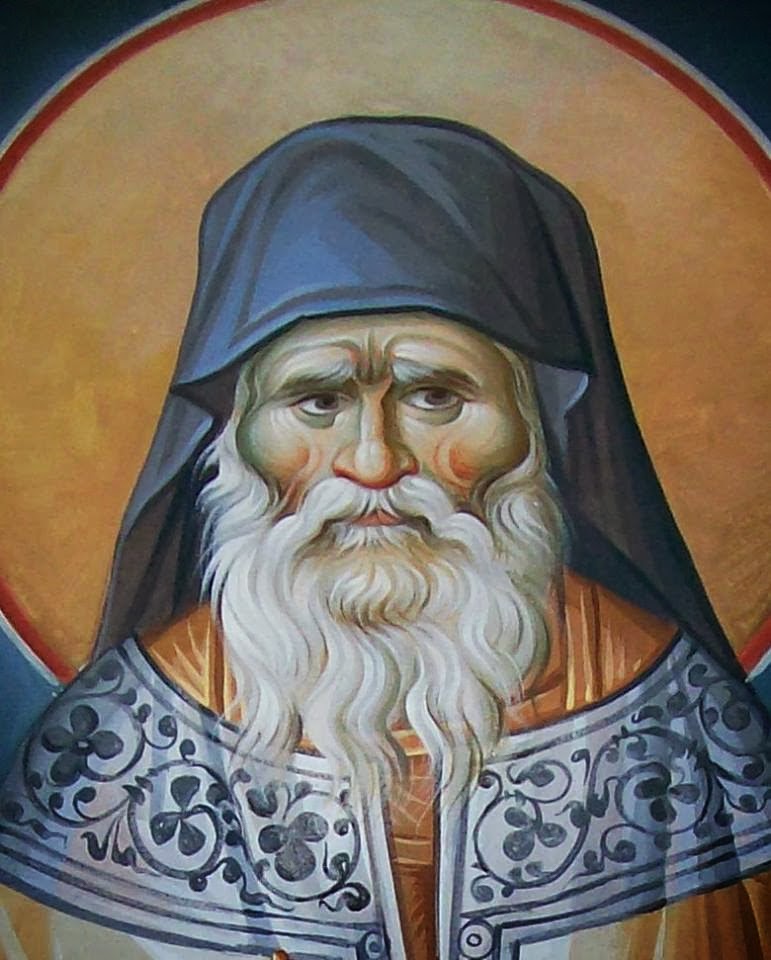The Nativity of Christ (source)
Greetings!
As we are beginning the Advent season, I pray that this may be a time when we might all draw closer to the Lord, Who is coming to save us.
I came across this Byzantine Christmas carol, originally from Pontos of Asia Minor, "
Anarchos Theos Kataveviken" ("The Beginningless God descended..."), and I thought to share a translation of such a beautiful and theological and moving carol (sung with Byzantine chant and instruments, but not at all used liturgically). May the Lord, Who is coming to be born in the flesh for our salvation, have mercy on us all and save us!
(Greek text)
Άναρχος Θεός καταβέβηκεν
και εν τη Παρθένω κατώκησεν
Βασιλεύς των όλων και
Κύριος, ήλθε τον Αδάμ αναπλάσασθαί
Γηγενείς σκιρτάτε και
χαίρεσθε, τάξεις των αγγέλων ευφραίνεσθε
Δέξαι Βηθλεεμ τον
Δεσπότην σου, Βασιλέα πάντω και Κύριον
Εξ ανατολών Μάγοι
έρχονται, δώρα προσκομίζοντες άξια
Ζητούν προσκυνήσαι
τον Κύριον, τον εν τω σπηλαίω τικτόμενον
Ήνεγγεν αστήρν μάγους
οδηγών, ένδον του σπηλαίου εκόμισεν
Θεός, βασιλεύς προαιώνιος,
τίκτεται εκ κόρης Θεόπαιδος
Ιδών ο Ηρώδης ως έμαθεν,
όλω εξεπλάγη ο δείλαιος
Κράζει και βοά προς
τους ιερείς, τους δοξολογούντας τον
Κύριον
Λέγετε σοφοί και
διδάκαλοι άρα που γεννάται ο Κύριος;
Μέγα και φρικτόν το
τεράστιον, ο εν ουρανοίς επεδήμησεν
Νύκτα Ιωσήφ ρήμα ήκουσε,
άγγελος Κυρίου ελάλησεν
Ξένον και παράδοξον
άκουσμα και η συγκατάβασις άρρητος
Ο μακροθυμίσας και
εύσπλαχνος, πάντων υπομένει τα πταίσματα
Πάλιν ουρανοί ανεώχθησαν
άγγλοι αυτού ανυμνήτωσαν
Ρήτορες ελθόντες
προσέπεσον βασιλέα μέγαν και ένδοξον
Σήμερον η κτίσις
αγάλλεται και πανηγύρίζει κι ευφραίνεται
Τάξεις των αγγέλων
εξέστησαν επί το παράδοξον θέαμα
Ύμνους και δεήσεις
ανέμελπον των πάντων δεσπότην και άνακτα
Φως εν τω σπηλαίω
ανέτειλε και τοις εν τω σκότει επέλαμψε
Χαίρουσα η φύσις
αγάλλεται και πανηγυρίζει κι ευφραίνεται
Ψάλλοντες Χριστόν, τον
Θεόν ημών, τον εν τω σπηλαίω τικτόμενον
Ω Παρθενομήτορ και
Δέσποινα, σώζε του εις Σε καταφεύγοντας.
(amateur translation of the above text)
The Beginningless God descended, and
dwelt in the Virgin.
Erouem, erouem, erou erou erouem.
Hail, O Spotless One.
(repeated after each verse)
The King and Lord of all, came to
refashion Adam.
O men of earth, dance and rejoice, and
you ranks of the Angels be glad.
Receive, O Bethlehem, your Master, the
King and Lord of all.
Magi are coming from the east, to offer
Him worthy gifts.
They seek to worship the Lord, Who is
born in the cave.
God, the King before the ages, is
carried within the cave.
Behold, Herod having learned of this,
was utterly astonished, the wretched man.
He cries out and screams towards the
priests, who are glorifying the Lord:
“Say, O you wise ones and teachers,
where is the Lord being born?”
O great and awesome wonder, for He Who
is in the heavens, departs them.
At night, Joseph heard the angel of the
Lord speak.
O strange and paradoxical hearing, and
unspeakable condescension.
He Who is forbearing and compassionate,
endures the offenses of all.
Again, the heavens are opened, and
angels hymn Him.
Rhetors have come, and fell down before
the great and glorious King.
Today, creation exalts and celebrates
and rejoices.
The ranks of the angels are astonished
at the paradoxical sight.
Hymns and entreaties they offer to the
Master and Ruler of all.
A Light has dawned in the cave,
enlightening those in darkness.
Nature rejoices and exalts, and
celebrates and is glad.
Let us chant unto Christ our God, Who
is born in the cave.
O Virgin-Mother and Lady, save those
who have taken refuge in you.
Children depicted singing Greek folk songs door to door (source)
Through the prayers of our Holy Fathers, Lord Jesus Christ our God, have mercy on us and save us! Amen!













